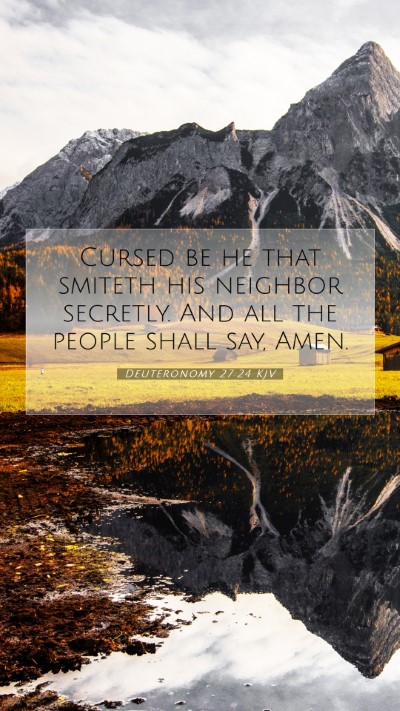Understanding Deuteronomy 27:24
Bible Verse: Deuteronomy 27:24 - "Cursed is anyone who secretly kills a neighbor. Then all the people shall say, ‘Amen!’" (NIV)
General Overview
Deuteronomy 27:24 serves as a crucial part of Moses' instruction to the Israelites concerning the covenant they were to uphold with God. This particular verse highlights the severity of the sin of murder, even when committed in secrecy, emphasizing the expectation of accountability within the community.
Bible Verse Meanings
The meaning of Bible verses can often be drawn from a multitude of commentaries that illuminate the text. Matthew Henry, Albert Barnes, and Adam Clarke provide insightful examinations that help deepen the understanding of this verse.
-
Insights from Matthew Henry
Matthew Henry emphasizes the morality behind the curse, noting that the act of murder cannot be hidden nor justified. The "cursed" designation serves not only as judgment upon the act but also serves as a communal call to vigilance against such heinous acts. This highlights the Christian moral imperative to not only avoid sin but to actively foster an environment that upholds righteousness.
-
Insights from Albert Barnes
Albert Barnes elucidates that the curse pronounced here acts as a preventive measure within the society of Israel. The public acknowledgment of ‘Amen’ signifies a collective agreement and reinforces societal commitment to the law. Barnes posits that this verse reflects the importance of community in maintaining moral order and encourages believers to support each other in living out their faith.
-
Insights from Adam Clarke
Adam Clarke offers a perspective on the secret nature of the crime. By emphasizing "secretly," Clarke highlights that God's moral standards transcend human attempts to conceal wrongdoing. This reflects the omniscience of God and the necessity for transparency in human relationships. Clarke's analysis underscores the idea that God sees all actions, therefore believers should strive for integrity.
Scripture Analysis
In-depth Bible verse analysis reveals the ritualistic aspect of this curse, integrating it into the larger context of the covenant. Deuteronomy 27 outlines curses and blessings that represent the consequences of obedience and disobedience to God's commands.
Historical Context
This verse comes from a section in Deuteronomy where Moses instructs the Israelites on the importance of upholding the law. Given the communal culture of ancient Israel, this curse acts as a reminder that everyone is responsible for keeping each other accountable, highlighting the interconnectedness of the covenant community.
Application of Bible Verse
Applying Bible verses to daily life involves reflecting on the implications of this curse for contemporary communities. The emphasis on accountability can inspire individuals to consider their roles in upholding moral integrity among family, friends, and society, as well as in community-oriented environments like Bible study groups.
Cross References
This verse correlates with several other scriptures that elaborate on similar themes:
- Exodus 20:13 - "You shall not murder." - Establishing the command against killing.
- Numbers 35:16-21 - Discussing cities of refuge for those who commit unintentional killings.
- Matthew 5:21-22 - Jesus’ teaching on anger and murder, expanding the understanding of culpability.
Conclusion
Understanding Scripture involves recognizing the weight of such verses and the profound truths they convey regarding morality and social responsibility. Researchers and Bible study enthusiasts can use resources such as bible study tools, bible study guides, and bible study resources to further explore these insights and apply them meaningfully in their lives.
Further Studies
For those engaged in online Bible study or bible study lessons, exploring the implications of Deuteronomy 27:24 can ignite discussions about sin, accountability, and community responsibility. It invites questions like:
- What does this verse teach us about the value of human life?
- How can we foster community accountability in our modern lives?
- What parallels can we draw between ancient Israel and contemporary society?


